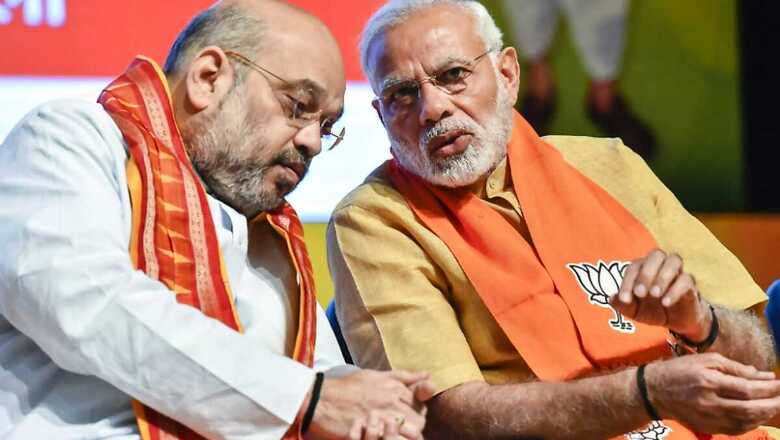
views
When Tarkishore Prasad, a member of the Backward Caste, and Renu Devi from the Extremely Backward Caste (EBC), sat by the side of Chief Minister Nitish Kumar on the podium at Rajendra auditorium during the oath-taking ceremony at Raj Bhawan in Patna, the message was loud and clear – the Bharatiya Janata Party (BJP) has assumed the role of the ‘Big Brother’ (Bade Bhai) in Bihar.
The presence of Union Home Minister Amit Shah and BJP president JP Nadda in the front row of the auditorium only ascertained it heralding the beginning of a new era of NDA politics in Bihar. The BJP, which has emerged as the single-largest party among four allies of the NDA, was in triumphant mode and almost hijacked the entire show rendering Nitish Kumar to despondently follow the ceremonials.
With two deputy chief ministers, the BJP has also taken the post of Speaker of the state assembly this time. Senior BJP leader and former minister Nand Kishore Yadav is all set to assume the post, indicating a fundamental change in party’s Bihar strategy.
The BJP also played the perfect caste card in cabinet formation as the caste configuration of the first set of the Bihar cabinet reflects a shift in social strategy. The backward castes and EBCs have been given prominence by elevating Tarkishore Prasad, a Bania by caste, and Renu Devi, a Nonia falling in the EBC category, as the deputy chief ministers.
For 15 years, the BJP had only Sushil Kumar Modi as the deputy chief minister. This time, Modi has been kept out of Bihar politics, especially after the declaration of the poll results. He is likely to be elevated to national politics as a union minister.
The saffron party also tried to keep the Yadavs in good humour by inducting Ram Surat Rai and an SC member from north Bihar, Rampreet Paswan, into the council of ministers. The upper castes in the cabinet include Mangal Pandey (Brahmin), Jivesh Mishra (Bhumihar) and Amarendra Pratap Singh (Rajput).
The Janata Dal (U) headed by Nitish Kumar, who belongs to the powerful Kurmi caste, has given representation to a Bhumihar (Vijay Kumar Choudhary) among the upper castes, a Yadav (Vijendra Prasad Yadav) and a Kushwaha (Mewalal Choudhary) among the backward castes, a greenhorn woman member of the EBC (Shila Mandal) and a Scheduled Caste (Ashok Choudhary).
The Hindustani Awam Morcha (HAM) has been represented by Santosh Suman, son of former chief minister Jitan Ram Manjhi belonging to the Musahar caste among the SCs. Vikassheel Insaan Party (VIP) chief Mukesh Sahani, who belongs to the numerically preponderant Mallah (fishermen) community among the EBCs, has been made the minister even though he lost the polls.
The change in the caste pattern is discernible as the social construct of the new Bihar Assembly has changed with an increase in the number of Extremely Backward Castes, Vaishyas and women legislators and reciprocal fall in those of the Yadavas and Muslims. As 21 more ministers are expected to be inducted, the BJP and JD(U) will have to work out a formula to give adequate representation to its social base in the near future.
The most striking feature of the cabinet formation is the absence of any Muslim face in the council of ministers. The NDA does not have any Muslim face as all the 11 candidates fielded by the JD(U) have lost. The BJP has not fielded any Muslim candidate in Bihar. “The JD(U) has couple of Muslim members in the Legislative Council who can be given a berth in the cabinet later on,” said a JD(U) leader.
The 2020 elections saw substantial decline in the number of Muslim legislators in Bihar. Altogether, 19 Muslim legislators have won this time against 24 MLAs in 2015 elections. There are seven Muslim MLAs from RJD, four from Congress, two from CPI-ML, five from AIMIM and one from the Bahujan Samaj Party (BSP).
The BJP leaders have substantive reasons on the ground to be on the offensive as the JD(U) leadership in Bihar has been weakened for the first time after 2013 when Nitish Kumar had unequivocally opposed elevation of Narendra Modi as the prime ministerial candidate. They had interpreted Kumar’s move to oppose Modi’s rise to national prominence as an instance of calculated opportunism.
Despite a clear win in the successive Lok Sabha elections, the BJP’s strategy in Bihar has been to keep the JD(U) leadership in good humour and sustain the popular faith in the NDA government at all costs. An internal pre-poll survey conducted by pollsters for the BJP had presented a buoyant picture for the BJP should the JD(U) exit from the NDA and go it alone in the assembly polls.
The new genre of BJP leaders, who are in the process of gradually taking over the state leadership, have pointed out that Kumar has been the biggest beneficiary of the BJP-JD(U) alliance. After the alliance was formed, Kumar was made the Union agriculture minister and then the railway minister when the NDA was in power for six years.
Thereafter, the BJP projected him as the chief ministerial candidate in the November 2005 elections in Bihar. Annoyed with the Lalu-Rabri regime, the NDA led by Kumar was voted to power with a clear majority. Since then, Kumar has proven to be a skillful administrator and a smart politician who flourished unhindered under the NDA umbrella.
Before the 2014 parliamentary polls, the JD(U) had left the NDA and contested the 2015 Bihar assembly elections in alliance with RJD. The then grand alliance of RJD, JD(U) and Congress had formed the government in the state also, but the political scenario changed in 2017 with the JD(U) returning to the NDA.
Having won the Bihar polls, the BJP wants to enter West Bengal in an emphatic way and hence, appointed Tarkishore Prasad as the deputy chief minister. Prasad belongs to Katihar with a substantial Bengali-speaking population bordering West Bengal.
The saffron outfit has set a target of winning more than 200 seats in the 294-member Bengal assembly. With Bihar done and dusted, the BJP is giving final touches to its electoral strategy and focusing on fringe areas bordering Bihar, Tripura and Assam for West Benagal assembly polls due in April-May next year.
In fact, the BJP was waiting for the Bihar assembly poll results before beginning its final assault on the Mamata Bannerjee government. The saffron outfit has already made inroads into Bengal by winning 18 of the 42 Lok Sabha seats in the state.
Read all the Latest News, Breaking News and Coronavirus News here


















Comments
0 comment